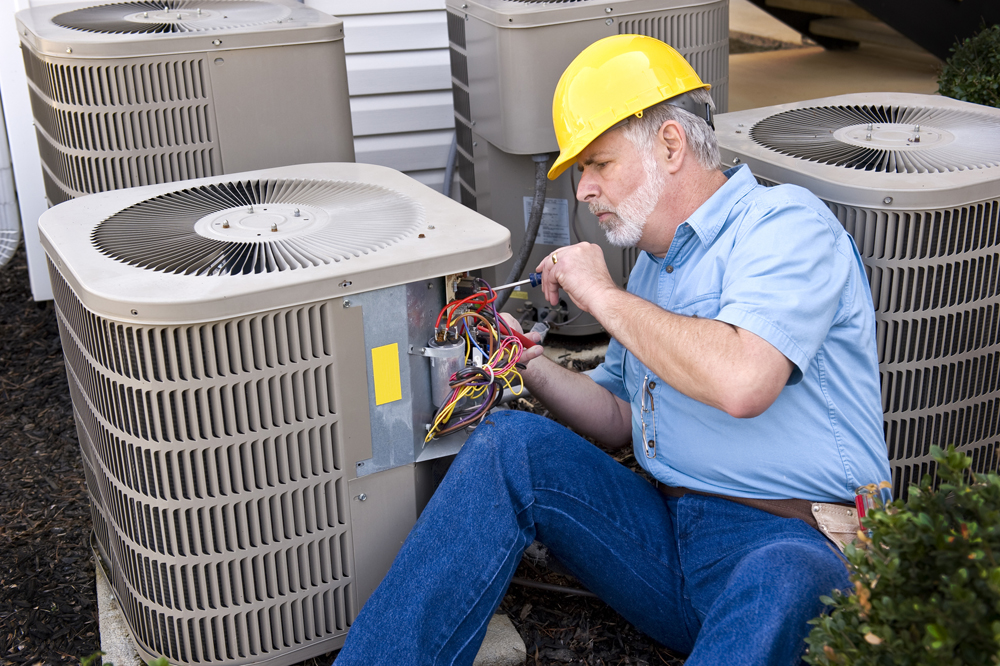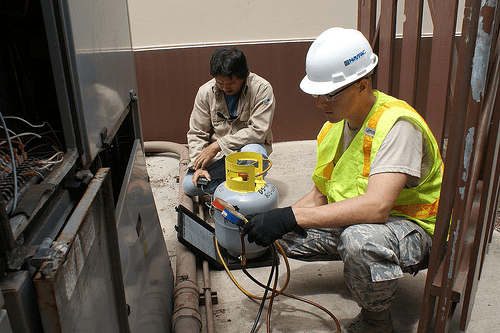What to Expect During a Professional furnace replacement
What to Expect During a Professional furnace replacement
Blog Article
Selecting In Between a Heatpump and Heating System: Trick Factors To Consider for Your HVAC Demands
When examining home heating alternatives for HVAC needs, the choice in between a heatpump and a heating system can be complex. Each system provides distinctive advantages tailored to details environments and energy effectiveness objectives. Understanding these differences is essential for making an educated option. Key factors such as setup prices and environmental effect even more make complex the choice procedure. Which choice truly lines up with one's convenience and sustainability preferences? The complying with sections will discover these considerations in detail.
Recognizing Heat Pumps: Exactly How They Function and Their Benefits
While many home owners consider numerous heating options, recognizing just how heat pumps feature and their benefits can significantly influence their choice. Heatpump run by transferring warmth as opposed to creating it. In the winter, they draw out heat from the outdoors air or ground and transfer it inside, while in the summer, they reverse this procedure, cooling the home by getting rid of heat outside. This dual capability makes them flexible for year-round environment control.One of the key advantages of heat pumps is their energy effectiveness. They make use of substantially much less electricity compared to standard heater, possibly causing reduced energy expenses (heat pump installation ooltewah tn). Additionally, heatpump have a smaller sized carbon footprint, making them an eco friendly option. They likewise require less upkeep than standard systems, contributing to lasting expense savings. On the whole, comprehending the auto mechanics and benefits of heat pumps can help property owners make notified choices regarding their home heating and cooling needs
Checking Out Heaters: Types, Operation, and Advantages
Furnaces come in various types, including gas, electric, and oil models, each with distinct operational mechanisms. Comprehending these differences is crucial, as they affect efficiency and heating performance. Furthermore, heating systems supply countless benefits, such as consistent warm outcome and reliability in cooler environments.
Kinds of Heating systems
Furnace can differ substantially in style and procedure, with heaters being a preferred option amongst property owners. There are a number of types of heating systems, each utilizing different fuel resources and modern technologies. Gas heating systems are common, leveraging all-natural gas to create warmth successfully. Electric heaters, on the other hand, utilize electric resistance to create heat, frequently favored for their simple installation. Oil heating systems, while less typical, are efficient in locations with minimal gas gain access to (ductless mini splits). Additionally, condensing heaters make the most of energy performance by capturing and recycling exhaust gases. Each kind operates via a system of warm exchangers and ductwork to disperse warm air throughout a home. Comprehending the differences in between these furnace kinds is necessary for informed heating and cooling decisions
Advantages of Heating systems
For home owners seeking reliable heat throughout cold months, the advantages of heating systems are significant. Heaters supply regular heating, making sure even temperature levels throughout the home. They are particularly effective in severe cold, commonly exceeding heatpump in frigid conditions. Numerous types, including gas, electrical, and oil furnaces, use flexibility to meet varied needs and preferences.Furnaces additionally tend to have lower initial setup costs contrasted to heatpump, making them a more accessible option for many. Their durable layout adds to a longer life-span, with many systems lasting over 15 years with correct maintenance. Furthermore, modern heaters are commonly furnished with innovative technology for enhanced effectiveness, which can lead to lowered power expenses. Overall, heating systems continue to be a reputable option for effective home heating.

Energy Performance: Contrasting Warm Pumps and Furnaces
When contrasting energy performance in between heatpump and heating systems, the Seasonal Energy Efficiency Proportion (SEER) plays a crucial duty in determining efficiency. Furthermore, an operational price analysis discloses the long-term financial effects of each system. Recognizing these variables can lead house owners in making educated choices concerning their home heating remedies.
Seasonal Energy Effectiveness Ratio
Energy efficiency plays an essential function in the decision-making procedure between heatpump and heaters, especially when taking into consideration the Seasonal Power Performance Proportion (SEER) This metric steps the cooling performance of heatpump over a whole cooling period, giving a standardized means to review efficiency. Greater SEER scores show better power performance, equating to lower energy usage and decreased energy costs. In contrast, heaters are normally examined using the Yearly Gas Utilization Effectiveness (AFUE) ranking, which reflects heating efficiency. When contrasting these 2 systems, home owners ought to focus on SEER scores for warm pumps, as they straight effect general power financial savings and ecological sustainability. A comprehensive understanding of SEER can notably affect the long-lasting satisfaction and cost-effectiveness of the picked cooling and heating remedy.
Operational Price Evaluation
Understanding the functional costs connected with warmth pumps and heaters is essential for house owners evaluating their options. Warmth pumps normally offer higher energy efficiency, transforming electrical power into warmth with minimal waste. This causes lower monthly energy bills, especially in moderate climates. On the other hand, conventional heating systems, particularly gas designs, might have reduced upfront expenses however can sustain higher operational costs with time because of sustain prices and performance ratings.Moreover, heatpump can function as both home heating and cooling systems, possibly lowering the need for different a/c units. While initial investments for heatpump may be higher, their long-term savings in energy efficiency can make them a much more economical choice for numerous houses. Careful analysis of neighborhood energy rates is important to figure out the very best choice.
Installment Costs: What to Expect for Each Heater
Installment costs for heating unit can vary substantially browse around this web-site between warm pumps and heating systems, affecting house owners' choices. Heatpump usually have greater upfront setup expenses, commonly varying from $3,500 to $8,000, depending upon the system size and intricacy of setup. This consists of the outside reference device, indoor handling system, and essential ductwork alterations. Alternatively, heaters often tend to have lower initial prices, averaging in between $2,500 and $6,000, which can be appealing for budget-conscious property owners. Nonetheless, setup expenses can increase if considerable ductwork is required.Moreover, the choice of fuel kind for heaters-- all-natural gas, propane, or electric-- can also influence installment prices. While heatpump supply energy effectiveness, their initial investment might prevent some buyers. Eventually, evaluating installment prices together with long-lasting cost savings and effectiveness will certainly aid homeowners in making informed choices about their heater.
Environment Considerations: Which System Executes Better in Your Area
Exactly how do climate problems affect the efficiency of home heating systems? The performance of warmth pumps and furnaces can differ considerably depending on the neighborhood climate. In modest climates, heatpump excel by efficiently transferring warmth from the outside air, making them an energy-saving option. Their efficiency decreases in very cold temperatures, where they might battle to extract adequate heat. On the other hand, heaters, particularly gas designs, supply reputable and regular warm despite exterior conditions, making them better in cooler regions.In locations that experience milder winters, heatpump can operate successfully year-round, giving both home heating and air conditioning. In comparison, areas with severe winters often gain from the robustness of heaters. Inevitably, understanding the neighborhood environment is important when making a decision in between a warm pump and a heating system, as it directly affects their operational performance and general performance.
Upkeep Requirements: Long-Term Treatment for Warmth Pumps vs. Furnaces
While both warm pumps and furnaces call for routine upkeep to guarantee peak performance, their details demands and treatment routines differ considerably. Heating systems typically need much less constant interest, with annual assessments sufficing to look for gas leakages, tidy filters, and examine total capability. Their less complex layout frequently permits simple repairs.In contrast, warm pumps necessitate biannual upkeep because of their double duty in cooling and heating. This includes cleaning coils, examining cooling agent levels, and guaranteeing that both the outside and indoor systems work at their best. Furthermore, heatpump maintenance often includes more intricate components, making expert servicing essential.Neglecting upkeep can bring about decreased effectiveness and raised energy prices for both systems. Inevitably, homeowners must consider these lasting treatment demands when selecting between a heatpump and see this site a heater, as positive upkeep can prolong the life expectancy and efficiency of either system substantially.
Environmental Effect: Choosing a Lasting Home Heating Option
The environmental impact of heating systems is a critical examination for property owners seeking lasting alternatives. Warm pumps are normally a lot more energy-efficient than standard heating systems, as they move warmth instead of produce it, considerably reducing carbon exhausts. By making use of renewable resource sources, such as air-source or geothermal warm pumps, property owners can better lessen their ecological footprint.On the various other hand, natural gas heaters release greenhouse gases and add to air contamination, though they usually give greater warm result. Improvements in technology have actually led to the growth of high-efficiency heaters that decrease emissions.Ultimately, choosing a heating system includes considering performance versus ecological impact. House owners are encouraged to assess local energy resources and motivations for renewable systems, making certain a selection that lines up with both personal convenience and ecological responsibility. The decision influences not only prompt comfort however likewise long-term sustainability and environmental health and wellness.
Frequently Asked Concerns
The Length Of Time Do Warmth Pumps and Furnaces Normally Last?
The life expectancy of heatpump commonly varies from 15 to two decades, while heating systems can last between 15 to 30 years. Normal maintenance considerably influences their longevity and effectiveness in supplying home heating options.
Can I Use a Heat Pump in Exceptionally Cold Climates?
Heatpump can operate in exceptionally chilly climates, yet their effectiveness decreases as temperature levels decline. In such problems, extra home heating sources might be needed to preserve comfortable interior temperature levels and ensure peak efficiency.

What Is the Noise Level of Warmth Pumps Versus Furnaces?
The noise levels of warm pumps and heating systems vary considerably. Usually, heatpump run more quietly than traditional furnaces, making them preferable for those conscious sound, while furnaces may produce louder functional sounds throughout heating cycles.
Are Warmth Pumps Suitable for Both Heating & Cooling?
Heatpump are without a doubt appropriate for both home heating and air conditioning (heat pump replacement ooltewah tn). They work by moving heat, supplying effective temperature control year-round, making them a functional selection for home owners looking for an all-in-one cooling and heating solution
What Dimension Heater Do I Required for My Home?
Figuring out the proper size furnace for a home needs assessing aspects such as square video, insulation quality, local environment, and the home's format. Consulting a specialist can ensure a precise analysis and optimal convenience. Heat pumps typically offer greater power efficiency, transforming electric energy into warmth with minimal waste. In modest climates, warm pumps excel by successfully moving heat from the outside air, making them an energy-saving option. Conversely, heaters, specifically gas designs, offer constant and dependable warmth regardless of outside problems, making them more effective in chillier regions.In areas that experience milder winters, heat pumps can operate efficiently year-round, supplying both home heating and air conditioning. Warm pumps are usually much more energy-efficient than traditional furnaces, as they transfer heat instead than create it, greatly reducing carbon discharges. By utilizing eco-friendly energy sources, such as geothermal or air-source warm pumps, homeowners can additionally decrease their ecological footprint.On the various other hand, all-natural gas furnaces emit greenhouse gases and add to air contamination, though they commonly supply greater warmth result.
Report this page